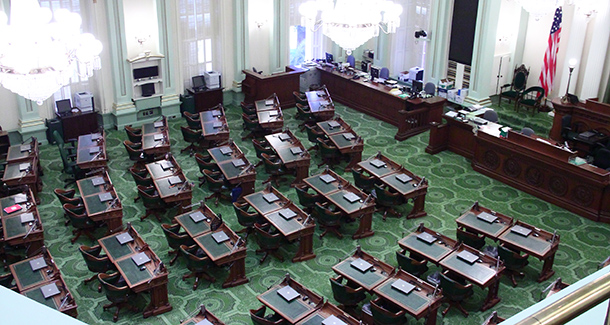
(Photo Credit: A Yee/Flickr)
Last week, while many were waiting on pins and needles to know if California’s state fabric would officially become denim (it did), hundreds of other bills awaited Governor Jerry Brown's approval or veto, namely ones that aimed to improve transparency in governance, increase the accountability of elected officials, and empower voters.
Every legislative session brings a host of proposals that aspire to achieve these goals, but this session in particular illuminated the power of broad, bipartisan coalition-building as an effective method of doing so.
As a bipartisan governance improvement organization, California Forward was a proud partner in several successful efforts to advance a more responsive and representative government that’s accountable for results.
One example is the modernization of the Cal-Access database system that tracks campaign spending, lobbyist reporting and independent expenditure campaigns. Currently outdated and dysfunctional, Senate Bill 1349 by Senator Bob Hertzberg will appropriate 1.8 million to update and overhaul the system.
What first started out as an initiative founded by Jim Heerwagen called the Voter’s Right To Know Act, this effort was made possible by compromise and bringing together disparate, and perhaps unlikely, partners. Civic organizations and nonprofits, as well as business, labor, environmental and civil rights groups, formed a movement that advanced a legislative alternative rather than a proposition.
CA Fwd made updating the dilapidated Cal-Access system a priority more than two years ago, and by working with leaders like Jim Heerwagen and other like-minded partners, the Legislature has successfully accelerated the upgrade project.
“Upgrading and modernizing the state’s campaign finance technology is a critical next step in restoring public trust in government,” said Jim Mayer, president and CEO of CA Fwd. “By making this important data easy to access, this work will more reliably provide Californians information about who is seeking influence by funding campaigns.”
Also approved last week, Senate Bill 1107 authored by Senator Ben Allen, is another example of the success of coalitions. Approved by Gov. Brown, this new law allows counties, cities, and the state to implement public financing of elections, which is an important step in reducing the influence of special interest money in campaigns. While this version successfully navigated the legislative process, two others in the form of initiatives had previously failed.
Considered an uphill battle as no Republican member has voted in support of public financing in recent memory, the power of a broad coalition allowed the Legislature to break through and reach across the aisle to advance good policy. CA Fwd joined the California Clean Money Campaign, California Common Cause, and 46 other partners including civic organizations, cities, boards of supervisors, academics and more, to support the bill's passage.
“The Legislature and Governor Brown responded to the incredible grassroots support for SB 1107, with 56,854 petition signers, 34,000 petitions sent to the Governor, 3,000 web comments, 1,650 phone calls and 257 tweets helping advance the cause of publicly financed elections in California,” said Trent Lange, President of the California Clean Money Campaign, one of the sponsors of the bill.
Additional momentum for SB 1107 came from efforts to update and improve the Political Reform Act through the Political Reform and Modernization project (PRAM), a group CA Fwd co-convenes.
Another legislative victory came in the form of Senate Bill 1108 also authored by Senator Ben Allen, which allows counties and general law cities to create independent redistricting commissions that draw district lines for elections. While redistricting commissions do currently exist in some local governments, they typically operate in an advisory only capacity.
By teaming up with good governance groups, civic organizations and The League of California Cities, the group advocated for the passage of SB 1108 which allows these commissions to have decision-making authority, effectively putting the power back in the hands of the voters. This has far-reaching implications on empowering historically underrepresented communities and reducing line-drawing as a political tool.
CA Fwd was an original partner in the work that lead to 2008's Proposition 11, which took the decennial job of drawing political boundaries away from state lawmakers and gave it to citizens to reduce partisan gerrymandering. After voters approved Prop 11, CA Fwd has also been a strong supporter of expanding citizens redistricting to other levels of government.
“This is a big step forward for local democracy,” said Nicolas Heidorn, legislation and policy counsel for California Common Cause. “Independent commissions are a redistricting best practice. California's state commission, which is responsible for redrawing congressional and state legislative districts, has become the national model for conducting fair, inclusive, and transparent redistricting. SB 1108 clears away outdated restrictions so that general law cities and counties can adopt this same reform.”
Increasingly, it has become apparent that bipartisan coalitions are the path to effective legislative action. Through partnerships, strategic planning and willingness to reach across the aisle, CA Fwd is proud to continue an era of reform by empowering voters and encouraging more responsive government.

